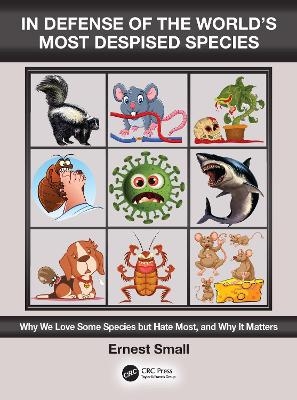
In Defense of the World’s Most Despised Species
CRC Press (Verlag)
978-1-032-53645-3 (ISBN)
Features
Theme of the book – human preferences for and against species – is novel, scarcely examined to date
Multidisciplinary analysis, especially psychology, biological conservation science, and ecology, as well as philosophy, agriculture, urban planning, human health, and law
Text is accessible, user-friendly, concise, and well-organized, making numerous complex topics comprehensible, readable not only by specialists, but also by students and the educated layperson
Includes over 2,000 high-quality, entertaining, and informative color figures
Dr. Ernest Small received a doctorate from the University of California at Los Angeles in 1969. He has since been employed with Agriculture and Agri-Food Canada, the country’s national department of agriculture, where he presently holds the status of Principal Research Scientist. He specializes on the evolution and classification of economically important plants, dealing particularly with food, forage, biodiversity, and medicinal species. The species Trigonella smallii (Small’s sweetclover) was named in his honor, and he himself has named dozens of new species. He is the author of 15 previous books, six of which received or were nominated for major awards. He has also authored over 400 scientific publications, mostly on economically important plants. Dr. Small’s career has included dozens of appearances as an expert witness in court cases, acting as an adviser to national governments, presenting numerous invited university and professional association lectures, participating in international societies and committees, journal editing, and media interviews. He has been an adjunct professor at numerous universities, and continues to supervise doctoral candidates. Dr. Small has received several professional honors, including: election as a Fellow of the Linnean Society of London; the G.M. Cooley Prize of the American Association of Plant Taxonomists for work on the marijuana plant; the Agcellence Award for distinguished contributions to agriculture; the Queen Elizabeth Diamond Jubilee medal for contributions to science; the George Lawson Medal, the most prestigious award of the Canadian Botanical Association, for lifetime contributions to botany; the Lane Anderson Award, a $10,000.00 prize for science popularization; the Industry Leadership Award of the Canadian Hemp Trade Association (subsequently renamed in his honor); the Outstanding Paper in Plant Genetic Resources Award of the Crop Science Society of America; and appointment to the Order of Canada, the nation’s highest recognition of achievements.
Introduction and Chapter Summaries. The Cruel and Compassionate Sides of Human Nature. Human Prejudice against other Species (Speciesism). Size: The most Important Determinant of Human Prejudice against and Preference for Species. Visual Determinants of Human Prejudices against and Preferences for Species. Non-visual Determinants of Human Prejudices against and Preferences for Species. Symbolic Creatures: Reflections of Human Prejudices against and Preferences for Species. Indispensable Values of Species for Human Welfare. Extinction: How Biased Elimination of Species Endangers Humans. Bias and Prejudice in Species Conservation. Dealing with Dangerous Species. Reforming Agriculture: The Greatest Threat to Species. Reforming Urbanization: The Second Major Threat to Species. Advancing Technologies and the Fate of the World’s Species. In Defense of the World’s most Despised: Invertebrate ‘Bugs. ‘Lower’ Vertebrate Animals. Mammals. Toxic Plants. Agricultural Weeds. Environmental Weeds. Urban Weeds. Epilogue: Tolerant Co-existence vs. Justifiable Biocide.
| Erscheinungsdatum | 07.10.2023 |
|---|---|
| Zusatzinfo | 12 Tables, black and white; 2 Line drawings, color; 795 Halftones, black and white; 797 Illustrations, color |
| Verlagsort | London |
| Sprache | englisch |
| Maße | 210 x 280 mm |
| Gewicht | 2620 g |
| Themenwelt | Naturwissenschaften ► Biologie ► Botanik |
| Naturwissenschaften ► Biologie ► Ökologie / Naturschutz | |
| Naturwissenschaften ► Biologie ► Zoologie | |
| Veterinärmedizin | |
| Weitere Fachgebiete ► Land- / Forstwirtschaft / Fischerei | |
| ISBN-10 | 1-032-53645-4 / 1032536454 |
| ISBN-13 | 978-1-032-53645-3 / 9781032536453 |
| Zustand | Neuware |
| Informationen gemäß Produktsicherheitsverordnung (GPSR) | |
| Haben Sie eine Frage zum Produkt? |
aus dem Bereich


